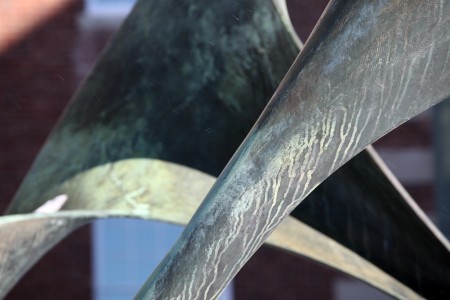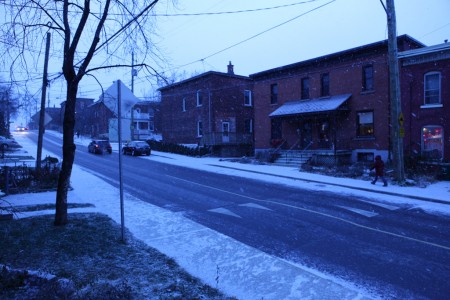I got some photos in the St. Patrick subway station, in Toronto.
Category: Toronto
Grandfather birthday photos
On Flickr, I have uploaded photos from my paternal grandfather’s 90th birthday party.
For the most part, they are lit with two flashes – one in the back corner of the room and one in a window alcove. One flash was fired using a radio trigger, the other using an optical slave sensor. Both had their output set manually.
They can also be viewed as a slideshow.
Widening the search
A while ago, I wrote about how I am looking for climate-related jobs in Toronto. So far, the search has not gone especially well. Positions listed tend to be either very junior or too senior. Also, most of what is available looks more tedious than meaningful or engaging.
For a number of reasons, I am now broadening my focus beyond Toronto. I am looking for jobs anywhere in the world that would offer the opportunity to apply my knowledge and skills to meaningful work on helping to fight climate change. I am also considering academic programs that would be useful, that would put me in contact with people doing interesting work, and that would put me in places where new and important ideas are developing.
If readers have any suggestions, please let me know.
Citizens arrest
There are good reasons why we restrict powers like arrest to trained agents of the government. While there are certainly many problems with the conduct of police and oversight over them, at least they have training and experience and there are mechanisms in place to evaluate their actions. By contrast, empowering every shopkeeper and random citizen to physically detain people who they think are criminals seems dangerous and unnecessary. In a few cases, it may be the least bad option available, but I think the onus should be on the person performing the arrest to justify it later.
In the grand scheme of things, shoplifting seems a lot less significant than physically detaining somebody against their will. Saying that as soon as somebody steals from you, you have the right to effectively kidnap them seems liable to create harm and abuse. Kidnapping is rightly considered a more serious offense than shoplifting, and I don’t think the fact that someone committed a crime before being thus apprehended has all that much legal or moral significance. It smacks of the sort of crude revenge-based legal systems where people get their hands lopped off (or get thrown into the terrible conditions of prison, but that is another discussion).
That’s why I think it is wrongheaded when people argue that David Chen – the Toronto shopkeeper who physically detained a shoplifter – should never have been criminally charged. When you opt to take the law into your own hands, you are effectively claiming that the situation is so important and so urgent that you should take over from the actual authorities. It seems to me that such cases are rare and involve things like real risks of injury or death – not the danger of losing a few dollars worth of merchandise.
If you feel that you need to usurp the powers of the police, it just seems sensible to expect that you may need to justify that choice in a court of law. They may well find that you behaved reasonably. But the fact that there will be some after-the-fact oversight could in itself act as a minor deterrent to abuses of power.
Home for real
With work resuming tomorrow, my month of wandering is now truly at an end.
Many thanks to all those who hosted me: Meaghan in Hamilton; my aunt, uncle, and cousins in Bennington; and my cousins and Tristan in Toronto. My appreciation also goes out to all the friends and family I was lucky enough to see over that span.
With my life returning to a state of greater regularity, people can expect more regular updates here, with photos from the various journeys forthcoming.
All told, my time away has reinforced my desire to move to Toronto – or at least away from Ottawa.
Jordan Peterson on psychology
As a lecturer, the University of Toronto’s Jordan Peterson is quite something. Yesterday, Tristan showed me videos of a couple of his lectures. One of them – The Necessity of Virtue – is available online.
One thing I found striking about the talks (which are mostly about psychology and ethics) is just how much we know about the brain, and how much we can reduce seemingly complex human behaviours and experiences to be predictable operation of certain brain structures. I had not previously realized the full importance of the hypothalamus. In one particularly grim example, Peterson explains that a cat stripped of almost all of its brain, but left with a spinal cord and a hypothalamus, will still behave much like an ordinary cat, except that it will be unusually likely to explore and unable to mate (if male).
What humanity is learning about the brain (which seems to produce the mind) seems likely to have considerable importance both for understanding the world in important ways and for deciding how to act in it. I will be adding Peterson’s Maps of Meaning: The Architecture of Belief to my reading list, and may even be able to finagle a way to audit one of his courses if I do move to Toronto.
2010 happenings
Some of my more notable 2010 undertakings and experiences:
- The end of the Low Carbon Cross Country Trip
- Two new jobs
- The transition from beardedness to beardlessness
- Time with Emily
- More than 12,000 photos taken
- Photojournalism and documentary photography course taken
- Several Montreal and Toronto visits (one wedding included)
- Collarbone breaking and partial healing
- Improved health
- BuryCoal launched
- Visits from some friends not frequently seen
- A solid number of books read
- Several concerts attended
- Camping with Rosa
- New York with Kai
- Multiple Vermont visits, Christmas included
- Blogging out loud
- Dozens of cans of kidney beans eaten
- Many kilometres by Greyhound
- A departure from my current home, nearly completed
The priority for 2011? Find a job in Toronto and move there.
Hamilton to Albany
The voyage from Hamilton, Ontario to Albany, New York is about 550km. At 3:30am, I caught a cab to the Hamilton GO train, in order to begin the journey.
Normally, the border is the most challenging part, crossing in a Greyhound bus. Either you get stuck in a substantial queue of other buses and need to wait hours to even get to the checkpoint or someone on your bus strikes a border agent as suspicious and they hold up the entire vehicle for hours. This time, however, the border went smoothly.
The trouble began in Buffalo. There, the bus driver decided to wait for the next Greyhound from Toronto to arrive, so that they could consolidate passengers and save some money. This meant sitting motionless in Buffalo for an hour beyond our scheduled departure time. As a result, I got to Syracuse 15 minutes too late to catch my connecting bus. The next bus, they told me, was at 5:00pm, arriving around 8:00pm.
In what I thought was an act of cleverness, I checked with the attached Amtrak station and found they they had a train leaving around 3:15pm. It was originally scheduled to be an 11:00am train, but they were confident it would actually arrive around three and arrive in Albany about two hours later. The train did arrive at about 3:40pm, and only sat around about twenty minutes before starting. Somehow, however, it managed to take about five hours to traverse the 250km to Albany. Part of the delay arose because the train had no heat and everybody was shivering in their outerwear. To correct that, they spent half an hour replacing one of the power cars. Nonetheless, the journey took about twice as long as advertised, even ignoring that delay.
As a consequence of all this, my uncle and cousin ended up waiting for me for hours in Albany, in order to drive me to Bennington. At the end of eighteen hours of continuous travel, I was particularly glad to see them and to have their help and company for the last stage of the voyage.
In the future, I will try to stick with the more straightforward Ottawa-Montreal-Albany route, rather than the seemingly more problematic Ottawa-Toronto-Albany route, with Hamilton thrown in as an enjoyable side-journey.
I have to be somewhere
I don’t think there has been any point in my life when I had open-ended time to myself. That is to say, a period where I could have gone and done anything without eventually violating somebody’s expectation that I would be in a particular place at a particular time.
As a child, nobody is in a position to determine the shape of their life (those who are forced to do so early are forced early into adulthood). In high school and university, there are breaks with defined endings. While working, I have applied for and received defined periods of vacation. I accepted a university position before finishing high school, accepted a grad school position before finishing my undergraduate degree, and accepted a job before finishing grad school. Now, I expect to accept a new job before reaching the defined endpoint of my current one. My calendars – literal or figurative – have always included a “first day at X” entry, somewhere out in the future.
I suppose the logical opposite of all that structure is the life of the aimless wanderer: the protagonist from On The Road or The Adventures of Huckleberry Finn. In addition to lacking obligations to appear at such-a-place and such-a-time, such characters tend to be unencumbered by burdensome possessions. Making the transition from one of those states to the other – in either direction – seems daunting. Both transitions highlight the limits of human freedom. Going from an unscheduled life to one filled with obligations involves accepting the restrictions that the expectations and actions of other place upon each of us, as individuals. The universe simply will not provide for us to do whatever we wish indefinitely. More grimly, the transition from structure to an open-ended existence seems inevitably bound to the idea of mortality, and the certainty that there will be a definite end to freedom as some unknown time in the future. Being cast into that expanse, without the benefit of near-term signposts to distract from the dire conclusion, seems likely to be frightening and macabre. Perhaps that perspective shows how I am more concerned about risk than excited about opportunity.
All told, certainty is a valuable thing. Similarly, if one wishes to influence the world, it seems promising when there are expectations about where one will be in the future, and what one will be doing. Still, it could be an interesting experience to face the unknown span of all of one’s remaining life without seeing significant set markers.
De-cluttering
During the next eight months, I will be moving twice. First, to the Beaver Barracks, in Ottawa. Then, to Toronto.
When I went to Oxford, I brought only a suitcase and a suit bag with me. When I returned, I had those plus two big cardboard boxes I mailed. I anticipate the move to Toronto involving a bit more baggage, but not enormously more. As such, between now and July, I will be selling or giving away most of my bulky possessions.
If you are in need to low-quality furniture, you might want to consider dropping me a line. I will need most of it for a few months yet, but it is never too early to express your interest in something. My free stuff listing is also likely to pick up new items in the next while.






